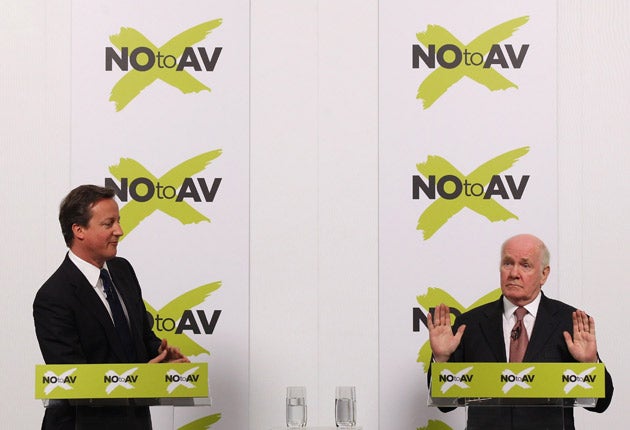Labour 'spitting blood' over Reid's backing for Cameron on voting reform

John Reid, the former cabinet minister, came under fire from Labour colleagues after sharing a platform with David Cameron to call for a No vote in next month's referendum on the voting system.
The former home secretary was accused of trying to sabotage Ed Miliband's push for a Yes verdict by joining forces with the Conservatives to oppose a switch to the alternative vote (AV). One political ally of Lord Reid said: "People are spitting blood. He is not speaking for the Blairites. He is promoting himself and speaking for himself. The view is that it is time he bowed out."
John Denham, the shadow Business Secretary and a long-standing supporter of electoral reform, accused Labour backers of the No campaign of "doing the Tories work for them". He said retaining the first-past-the-post system could delay Labour's fightback in the south, the south-west and east of England, where the party did badly at last year's general election.
"First-past-the-post supports the dominant two parties and is unfair on the third party. In huge areas of southern England, Labour is the third party," said Mr Denham. "The judgement of the Labour No campaign is wrong in principle on electoral reform and bad for the Labour Party politically. It doesn't take into account the country's electoral geography."
Officially, the pro-reform camp hoped Lord Reid's surprise intervention would backfire by angering Labour supporters, who are widely thought to hold the key to the 5 May result because the Tories oppose change and the Liberal Democrats support it.
Lord Reid, normally regarded as an anti-Tory attack dog, admitted that he and Mr Cameron did not agree on everything, but denied he was isolated inside the Labour Party. He said more than 200 Labour MPs and peers, hundreds of Labour councillors, thousands of ordinary members and several members of the Shadow Cabinet would vote No to AV. "Most importantly I stand with those ordinary people of this country who have no party affiliation at all, but who want to defend their own right to an equal and fair say in choosing their government. That is what this campaign is about," he said.
Lord Reid declared that AV was not "fair", "equal", or "British". In a sideswipe at Liberal Democrats, he said: "It would be an outrage to try and secure a change to the electoral system for tactical party advantage."
Appearing alongside Lord Reid, Mr Cameron reflected fears in the No camp that the Yes campaign could win the referendum on a low turnout. "Millions of people in our country aren't engaged in this debate or this argument at all," he said. "It is up to us on the Yes and No side to fire people up and say this matters, and is about what sort of democracy we are."
He added: "The biggest danger right now is that Britain sleepwalks into this second-rate system, waking up on May 6 with a voting system that damages our democracy. We must not let that happen."
The Prime Minister denied condoning personal attacks on his deputy, Nick Clegg, who has featured prominently in the propaganda of the No movement. "I don't run the No campaign, I run the Conservative No campaign," he said, insisting the Tories were making a "positive case" for the present system.
On a day when the referendum campaign finally caught fire, Mr Miliband complemented the Cameron-Reid axis by simultaneously sharing a platform with Vince Cable, the Liberal Democrat Business Secretary.
The Labour leader reiterated the argument he made first in an article in The Independent yesterday, urging voters not to use the referendum to give Mr Clegg a "kicking". He appealed to them to vote for "hope over fear" and for an end to Britain's "broken politics".
While happy to rub shoulders with Mr Cable during a photocall, Mr Miliband defended his decision to refuse to appear on a pro-AV stage with the Liberal Democrat leader. Insisting that would help the No camp to make Mr Clegg their "poster boy," he added: "I will share a platform with anybody I think can help us win this referendum."
Mr Cable, once an aide to the former Labour leader John Smith, looked relaxed alongside Mr Miliband but criticised his decision not to appear alongside Mr Clegg. He denied the Liberal Democrat leader was a "liability" for the Yes camp. "I would like to see them sharing a platform," he said.
Strictly speaking . . .
* One of the strangest claims of the campaign was Vince Cable's assertion yesterday that "if Strictly Come Dancing were decided on the basis of first past the post... Ann Widdecombe would be the undisputed choice as the best dancer in Britain".
Under AV and in Strictly, there are several rounds of voting, with the lowest-placed candidate knocked out in each round, until only two are left. Winning the first round is not what counts. But as the No to AV campaign pointed out, under AV, the public casts its vote only once, voting for as many candidates as they choose, placing them in order of preference. In Strictly, a viewer could vote for several of the couples but only on the basis of one call, one vote. They cannot rank them in order of preference. Also, in Strictly the public's judgement is not final; it is an electoral college, in which viewers have half the votes and the judges the other half
But Mr Cable is roughly right. If there had been just one ballot, and the person with the highest number of votes had been declared winner, Ann Widdecombe would have stolen the crown.
Subscribe to Independent Premium to bookmark this article
Want to bookmark your favourite articles and stories to read or reference later? Start your Independent Premium subscription today.

Join our commenting forum
Join thought-provoking conversations, follow other Independent readers and see their replies